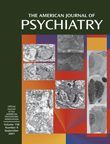Dr. DeBattista Replies
To the Editor: Drs. Watson and Young propose an interesting and wholly plausible explanation for the finding of decreased Hamilton depression scale scores associated with the short-term infusion of hydrocortisone infusion in our study. They propose that the short-term antidepressant effects of hydrocortisone result from facilitation of 5-HT1A neurotransmission, while long-term administration may lead to a reduction in postsynaptic 5-HT1A receptor numbers and depression (Young et al., 1994, J Affect Disord; Young et al., 1994, Psychopharmacology). The differences between the effects of short- and long-term administration of hydrocortisone on serotonergic transmission are consistent with the clinical finding of the mood-elevating effects of acute glucocorticoid administration and the depressogenic effects of long-term administration.
However, a serotonergic hypothesis does not exclude other possible explanations, including the possibility that hydrocortisone might affect other monoamine and peptide neurotransmitters, such as dopamine and β endorphin. It appears likely that the psychiatric effects of exogenous glucocorticoid administration are mediated by a complex interaction of multiple neurotransmitter systems. Therefore, the evidence that hydrocortisone has an important effect on 5-HT1A neurotransmission is compelling.



